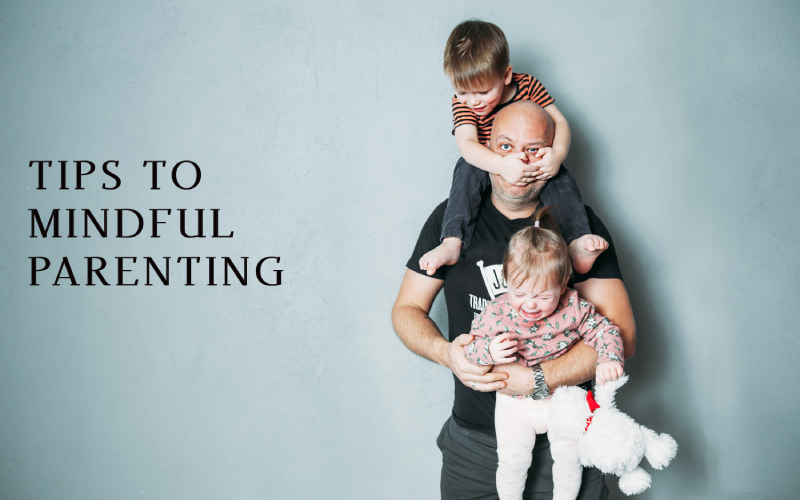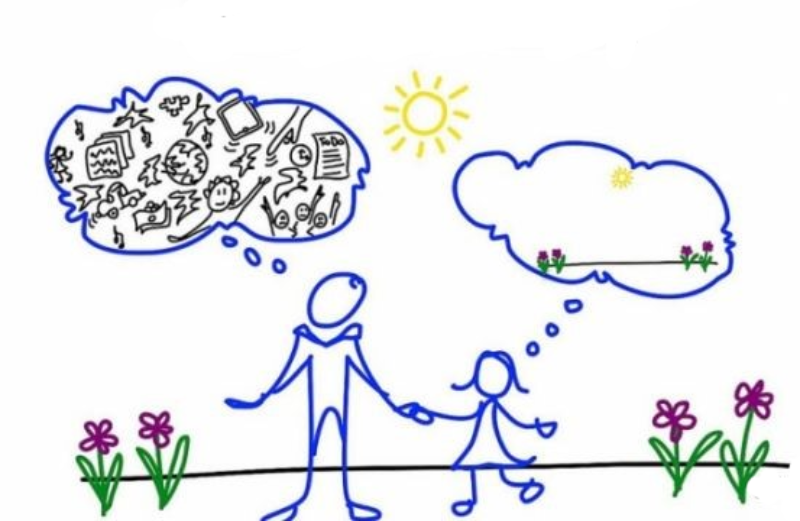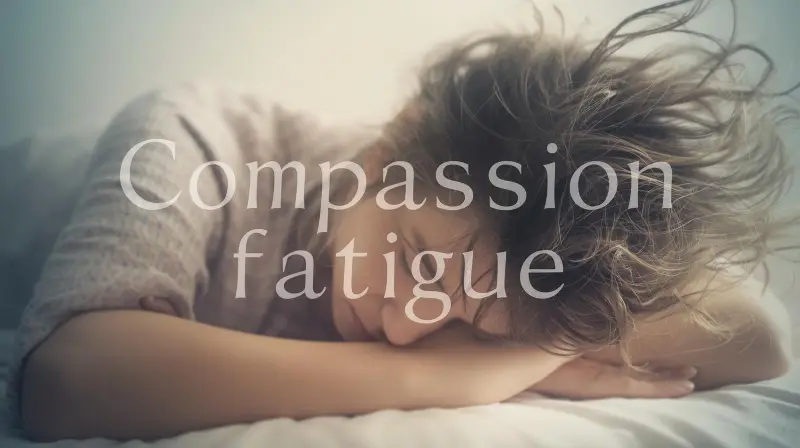Parenting is hard and comes with a huge existential responsibility. The responsibility of nurturing and guiding the next generation, the contributors to the future of the world. It matters immensely to parents what their child will turn out to be, because, when looked at in a wider sense, it is indeed a task too heavy to ever be done perfectly. And who doesn’t secretly want to be perfect?
That’s what we are all wrong about. Because what exactly is perfect? Some would claim nature is perfect. But is nature perfect because it is without flaws, or is it perfect because we accept nature as it is? For we can surely find so-called ‘flaws’ in nature, but the truth is that parents become their child’s worst enemy when they start trying to control the child and its personality traits. When we try to push our children towards this abstract ‘perfection,’ we are unwittingly stifling who they are.
Parenting is hard and the best way of going about it is by being emotionally mature. Yes, parents are only human and bound to get frustrated. They are bound to have fits and lose control of themselves. And while these things are natural, we must understand that between us (parents) and our children (young and emotionally immature), it is we who are the adults. It is us who the kids look up to, us who are capable of mature and rational thought. And even as there are times when we wish to let out our instinctive irrational behaviors, we must not.
So then, what to do? How can parents retain their sanity without those random outbursts? How can parents better understand their children, even when they are acting incomprehensibly? In this article, we introduce the concept of mindfulness in parenting. An approach where parents are mindful of their emotions and the impact their automatic reactions can cause.
What is Mindfulness?

Mindfulness is a part of Buddhist meditative practices. It corresponds to being mindful of our surroundings and happenings.
Sometimes, we get too immersed or carried away by the heat of the moment and react too quickly, with too little thought. Mindfulness is about calming down and paying attention to even the minutest things around and within us.
Mindfulness is a great activity to get acquainted with oneself. We find that sometimes we are not conscious of certain emotions and feelings within us, or we do not let our mind process them before we act, or rather react.
Mindfulness begins with taking a step back (figuratively) from whichever messy situation is chipping away at your control.
Mindfulness for Parents

In terms of how they make a parent feel, a child can be described as a bomb that does not stop exploding. Children can be challenging, to say the least, and more so when we are unable to understand the cause of their troubling behavior. This holds true for infants as well as adolescents, though their ‘troubling behaviors’ differ entirely.
Children look up to their parents, even adolescents, even though they may not show it. They notice what their parents are doing and how they are reacting, and that determines their idea of the world and its ways. To retain the mental well-being of the parent as well as the unhindered development of the kids, mindfulness can do wonders.
Many times, as parents, we even regret shouting too loud or being too harsh. This happens because later, when we have had time to process and understand our emotions, instant reactions, and their consequences, we find that the level of harshness in our tone or judgment was uncalled for.
Tips to Mindful Parenting

There are four main steps to Mindful Parenting.
Lending a Genuine Ear
As parents, we know we are more mature and possess more worldly knowledge. But this doesn’t mean we can shrug off our child’s emotions or concerns, even if those concerns are childish.
Childhood is a stage of life, and one must first be foolish to become wise. And it is also true that a situation is not always as it seems to be. Maybe it was completely different from what we thought. A smoking complaint from the school or a neighbor may make us think there’s nothing that could possibly justify it, and hence, there is no need to let the child’s side be heard. But just the fact that we respect our kids enough to let them speak for themselves is a big indication.
It may be that our child was wrong still, or it may be that there was a genuine misunderstanding. But as each person deserves, letting our kids be heard is a big part of raising them.
In the above example, if it proved to be a misunderstanding, the child would know that they could trust us to be on their side. If the child was indeed smoking, the act of giving them a chance to speak would let them know that we trusted them, and this would help them realize their mistake all the more.
Especially in adolescence, there are times when children just want to be heard, to be understood. The poem Please Listen by Leo Buscaglia articulates perfectly the importance of simply hearing someone out (especially teens) without judgement or interruption.
Acceptance
Lack of acceptance is statistically the biggest cause for rifts in child-parent relationships. It is a different thing to teach the child values, manners, and other basics. But each person is different, and children’s opinions and way of life need not match their parents’.
As a parent, it is a desire to have the child be perfect at what we were not or to have the child reach greater heights in life. Many a times, there are expectations that we put on our kids as to how they should live their life, which political ideology, religion and customs they must follow. It is all understandable, but doesn’t a person have a right to choose their own course of life? Do we give birth to bring a new soul into this world, or do we give birth only to leave copies of us behind?
Each generation finds faults with their elders and youngsters. That has been the case since time itself began. We may disapprove, but let us show our disapproval and not exert our force. Let us give suggestions and advice, not ultimatums.
Acceptance is also in reference to emotions. We can accept the fact that we are angry and disappointed; we can even display this after having thought it through. (Remember: respond, do not react) while simultaneously accepting that our child has chosen a different way of life.
Emotional Maturity

Emotional maturity encompasses the whole world of emotional intelligence. The ability to identify, understand, accept, and regulate our emotions.
Emotions are complex and, when left unattended, can come out in ugly and unconnected ways. The frustration with an unrelenting infant can express itself through rude behavior towards a client.
Adults of emotionally immature parents end up with childhood trauma and have to go see a psychologist. The book Adult Children of Emotionally Immature Parents: How to Heal from Distant, Rejecting, or Self-Involved Parents by Lindsay C. Gibson can be a real insight into how the emotional maturity level of parents affects their children. It also helps with healing from trauma and problematic personality traits gained by children thereon.
As a parent, try to understand where your child comes from. What is troubling them? What has caused them to behave in an unbecoming manner? Put yourself in their shoes, and maybe you’ll know how to best deal with it so that you can help them feel better. Most of the time, our children trouble us; they do not enjoy it. Just as we have tumultuous emotions, so do they. Being an adult and helping them through it (after dealing with our own) is the best way of going about it.
Another big thing to realize in this regard is the fact that just like we may come with burdens from our office or workplace, so do they from their peers, school/college and nowadays, the internet.
Self-Regulation
This tip should be sworn by even when dealing with people in general, but it becomes especially crucial when it comes to children. Our outbursts or raised voices affect children tremendously. They notice the slightest change or hostility in us. More than their own, our stress and anger affect them more. They consider us their pillars of strength, the ones always calm and soothing when they fall or lose a toy. When they notice even their pillar of strength losing it, they get terrified and subdued.
Another reason to calm down before reacting is the reactive nature of judgement. We look at an issue at face value; sometimes, we even add our frustration or anger at something else to how we see the current situation, leading to a more heightened reaction.
Suppose a parent had a bad day at work, and their boss yelled at them. On the way home, they were stuck in traffic for an hour. Now, when they finally reach home and find that their kid has painted the house pink with lipstick, how would they react? It is a human trait, bottling up emotions we cannot show and then unloading them where they don’t belong. In such a case, it is best to take deep breaths and first calm down, maybe have some water before dealing with the pink house.
Compassion
This is the last and the most crucially simple tip. Compassion. It is easy to be kind when you’re feeling good, the hardest and most necessary kindnesses are the ones given in times of personal trouble.
Let us be compassionate to ourselves as well as to our kids. Every story has two (or more) sides. Let us strive to understand all of them and then begin to act.
Conclusion
Mindfulness is all about taking a step back and noticing all that we never do. Even with all of these tips and suggestions, there will (of course) be moments when you just cannot control your anger, panic, or frustration. In moments such as these, stop thinking, stop panicking, and just take deep breaths. Then, slowly start noticing what each of your senses is picking up—a smell, a sound, a visual, an emotion, etc.
Ever wondered why the severe troubles of people in comedy shows seem so funny when if they happened to us, we’d not find them funny at all? It’s because of the element of outside perspective. Be mindful of yourself and your surroundings, and just look at it all from another perspective. As Benedict Bridgerton said, ‘It’s simply a matter of perspective.’




